
views
Staying Positive

Focus on what you are doing right. Part of keeping a positive attitude is focusing on what you are doing well and doing right. Thinking about these positive aspects can help you to stay focused and happy, as well as allow you to learn what already works best for you. By thinking positively and discovering what you are doing right you can stay optimistic and enjoy your achievements. Focus on your strengths, knowing that you can use them to improve your grades. Knowing what works for you can give you a good idea of what to do going forward. Think about how well you have already done. Getting a B is not an indication of failure and is still a great grade.

Re-frame negative thinking. Negative thinking might be tempting to indulge in if you are unhappy with your grades. However, having a negative inner dialogue about your situation may actually be doing harm and can make it more difficult to work towards improving your grades. Try to re-frame negative thinking to make it easier when working to improve your grades. Instead of being hard on yourself by saying something like "I'm worthless," try to think something like "The course was difficult and I did my best." You wouldn't speak to another person in a cruel or uncaring way. Treat yourself with the same kindness, respect and courtesy you would with another person or someone you love. Monitor your thoughts for negative thinking. If you notice yourself beginning to think poorly about yourself or your grades, stop and replace it with a positive thought about yourself and your achievements.
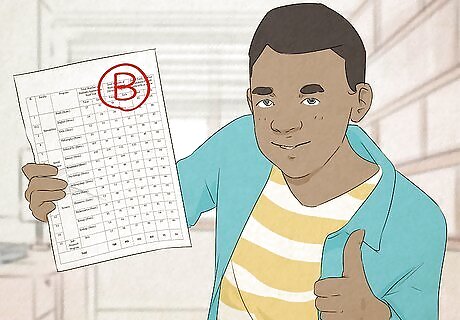
Keep up your motivation. Getting a B when you are a used to getting A's might feel discouraging. Not meeting a personal goal can cause you to question the entire effort, making it tough to recover your motivation. Stay focused on how well you are doing, setting healthy goals, and work towards meeting them. Getting organized can make your path to higher grades more clear, making it feel more obtainable and increasing motivation. Remind yourself that although you want an A, getting a B is not a bad grade. Focus on how well you are already doing instead of thinking how much better you should have done. Use your B grade as a sign that you can do well even in a highly challenging course. Engage in healthy goal setting. Work to do your best without being overly hard on yourself.
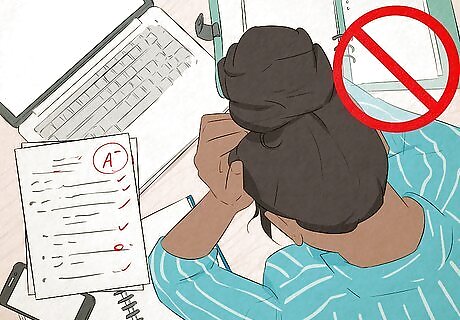
Be aware of perfectionism. Striving to be and do our best in life is a great way to live. However, people can strive and reach too hard, causing themselves unneeded stress and pain. Examine your thoughts and attitudes about your academic work and try to avoid any instances of perfectionism. Perfectionists will set unrealistic goals, will never be satisfied with anything less than perfect results, will feel crushed by failure, will be preoccupied by fear of failure, will view failure as evidence of worthlessness, and will be extremely defensive in the face of criticism. Those setting healthy goals will have reachable but challenging goals, will enjoy both the results and working towards them, will easily recover from failure, won't be overwhelmed by fear of failure, will view mistakes as learning opportunities, and will take criticism well.
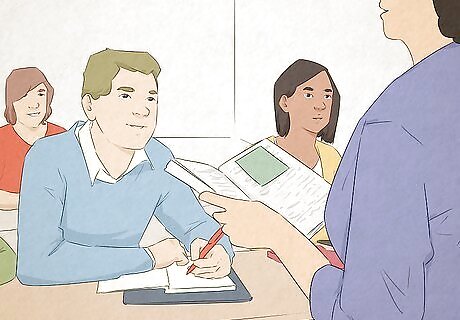
Understand that college courses are more difficult than high school classes. If you have recently transitioned from high school courses to college courses, it's not unusual to get slightly lower grades. College level courses are often much more challenging than high school classes. This increase in difficulty can result in a lower grade and it is nothing unusual or something to feel ashamed about. Remind yourself that getting a B in a highly demanding course is still a great achievement. It may take time to adjust to the difficulty of your new courses. Don't expect an immediate and perfect response to the challenge. Allow yourself time to adjust.
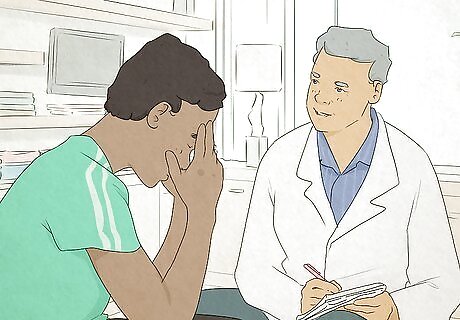
Talk to a counselor. If you are experiencing a lot of anxiety over getting a B or having a hard time not thinking about your grade, it may be time to seek professional help. Talk to a counselor at your high school or college. Grade anxiety is very common, and a counselor can help you improve your coping skills and work on your academic performance.
Improving Your Grades
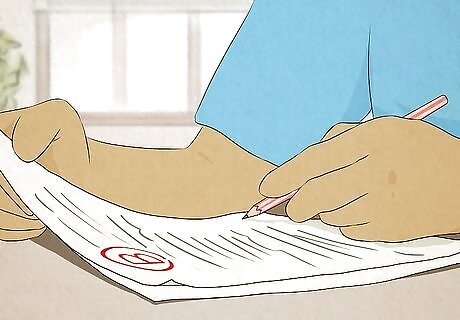
Examine the reasons for your current grades. If your grades have slipped or you are not meeting your academic goals, then you will need to discover the reasons why. Although each person will have their own unique reasons as to why their grades are lower than they would like, reviewing the following common examples can help you discover your own: You may have difficulty in one specific area of study. Scheduling problems can lead to you handing assignments in late, resulting in lost points and lower averages. Your notes might not be as detailed as they could be. Paying attention during a class may be difficult for you and cause you to miss important information.

Study with friends or classmates. Studying alone can be an effective way to understand and retain the information presented in your classes. However, working with others can help you achieve an even deeper understanding of the information by engaging in a dialogue, allowing you to encounter new ways of viewing the topic being studied. Ask your friends or classmates if they want to create a study group. Set up times when you can meet and discuss the material you are studying. Study groups expose you to new approaches and viewpoints regarding the topic.
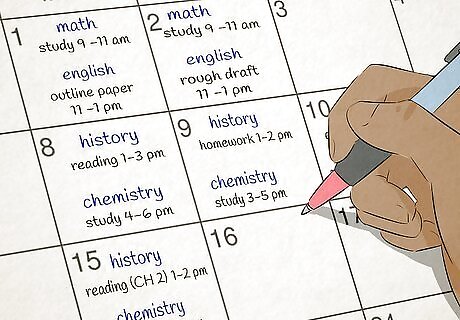
Improve your scheduling practices. Working to create and follow a schedule for your class work and study sessions can help you to avoid submitting work late as well as allow you plenty of time to fully absorb information. By creating a schedule you will be able to ensure enough time is available for you to get the most out of your studies and improve your grade. Try setting aside time each day for study, projects, and assignments. Make sure your goals are definite and clear. Stick to your schedule after you have created it.

Don't be afraid to talk with your teachers. If you are unsure of what you can or need to do to improve your grades, you can try speaking with your teachers. Your teacher will have a good idea of what you can do to work towards improving your grade. Working together with your teacher can be an effective method to get the A's that you want. Your teacher will likely be able identify issues you may be having with the material and give you advice on how to overcome them. Your teacher may be able to explain information in a more detailed way for you. Special assignments or extra work may be allowed in order to increase your grade. Avoid just asking your teacher "How do I get an A?" This can seem as though you are only interested in the grade, not the topic. Instead, ask "How can I improve my performance in this course?"

Give class time and homework your full attention. Paying attention and truly focusing during class and when working on assignments can improve the amount of information that you retain and the quality of your work. You may also find and increased understanding of the information when your full attention is given to instruction or assignment. Try to eliminate distractions during class or when working on an assignment. Focus on what your instructor is saying during a lecture. Avoid talking with friends or playing on your phone during a class lecture. Focusing during study sessions will help you to remember the information and do well during testing.



















Comments
0 comment